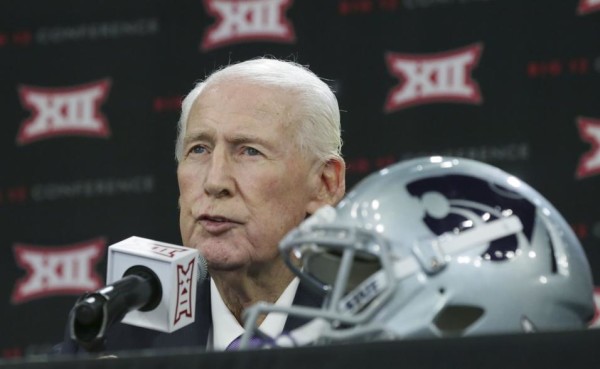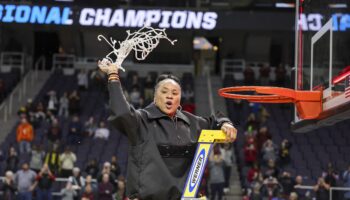
 – by Andrew Leffler
– by Andrew Leffler
A Lot of Sports Talk contributing writer
FRISCO, TX — The rules ruled the start of day two of Big 12 Media Day, as the morning was kicked off with current National Football League referee Walt Anderson, who also is the coordinator of the officials for the Big 12,taking the main stage to talk about the upcoming adjustments to officiating and enforcement for the new season. Overall, he discussed minor changes, all focused on making the game safer for Big 12 Conference football players.
“We don’t really have a lot of rule changes this year,” Anderson said. “But there are some I believe will be of interest to you and some other changes relative to some administrative tasks that we as officials will have that are certainly going to impact certain aspects of the game.”
An issue that Anderson addressed was the duration of football games, which has increased over the past few seasons.
“I know last year we were up to 3:20,” he said, regarding the length of the games. A change for this upcoming season is that officials will react quicker whenever the clock is outside of two minutes. The first is going to be, when that player does run out of bounds outside of two minutes of each half, the officials are going to be much quicker about getting the clock wound.”
Anderson noted that an issue of last year, and years before was it, was the inconsistency shown by officials in when to start the clock after plays were completed.
“There were times when the football would be down on the ground, we’d wait a little bit, then the referee would wind the clock,” Anderson said. “The goal here is to cut as much extra, unneeded game time, so that games don’t drag on.”
The other slight change to shorten games is to reduce the length of halftime, which will be 20 minutes for all regular season games. Anderson said there will no longer be special treatment in terms of stretching halftime.
“There will be no more requests by individual institutions to extend that for whatever purpose,” said Anderson. “I know in the Big 12, most of our schools ask for five-minute extensions for various purposes, be it Homecoming, be it Senior Day, whatever that might be. That is no longer allowed.”
Pertaining to gameplay, Anderson spoke in detail about leaping and leverage. The issue of players jumping over the special teams’ line to get to the kicker is prevalent primarily during field goals and punts. Anderson made the legal distinction between players who run towards the line of scrimmage at the snap and those jumping through the gap (area between two linemen) while lined up on the line, with the latter being allowed.
“All he does is, he places his hands on the opponent as he goes over the top,” Anderson said when explaining a video being shown to provide an example. It becomes illegal, however, when a player that is not on the line of scrimmage runs and jumps over the lineman. Anderson’s reasoning to why this was no longer allowed, and would be called more frequently in the upcoming season, was a safety reason.
“Severe head and neck injuries, compression of the spine is something that could very easily occur in this type of action,” Anderson said.
Later in the morning, the remaining five coaches took the stage one at a time, with one of the new coaches in the league starting the day off.
A Return to Glory? (Texas)
It has been over a decade since a Big 12 school has won the national championship, with the University of Texas winning the 2005 BCS National Championship Game at the Rose Bowl. Since then, Texas football has struggled.
Last season was yet another of a long line of disappointing seasons for the Longhorns. Their big overtime win against then No. 10 Notre Dame in the season opener seemed like the team was going in the right direction, and Charlie Strong’s second year as head coach would be better than his first.
That wasn’t the case.
The Horns finished the season 5-7 and lost twice as many conference games than it won (3-6), including a humiliating overtime loss to a Kansas team that had lost 19 consecutive Big 12 games before that. The dismal season resulted in the firing of Strong one day after the team’s loss to TCU in the season finale. His replacement, coach Tom Herman, is coming off two seasons as head coach at the University of Houston, which included a 13-1 season in 2015 in which it defeated No. 8 Florida State in the Peach Bowl to close out that season.
Herman wants to reestablish a winning mentality at the University of Texas, and it starts in the offseason practice field.
“Everything from off-season conditioning drills, where we have winners and losers, and the winners get to eat a better meal and not the losers,” said Herman. “The list of competitions and tangible rewards for winning, but also tangible consequences for losing.”
In the past three seasons, the Horns have gone 16-21, and despite the school sporting a number of winning seasons between their ’05 championship and now, the team hasn’t had the national success it once had.
“I think losing has to be awful, and you can never get used to losing,” Herman said of a team’s struggles in general. “That is one of the biggest, maybe, downfalls of a lot of teams is you get used to losing. No, losing is awful. It’s awful. It’s not just, ‘Oh, well, we’ll get them next week.’ No, this is like the sky-is-falling-type stuff. And so every time we have a competitive situation, we’re going to make sure that the people that don’t win in that competitive situation, that they feel awful about it and that it’s not funny and it’s not hokey or corny, that it’s really, really bad for them to lose, as well as it being very, very cool for the guys that win and very rewarding for the guys that win.”
Herman acknowledged that the past few years haven’t been easy for the football program, beginning with the departure of former head coach Mack Brown.
“We’re talking about a Hall of Fame coach leaving, a Hall of Fame athletic director leaving (DeLoss Dodds), a president leaving (William Powers Jr.), a new president coming in (Greg Fenves), a new AD getting hired (Steve Patterson), that AD leaving, a new interim AD leaving, the next head coach leaving and not having success,” Herman highlighted. “So I think there was a lot of non-continuity, if that’s a word. There just wasn’t any stability from the top down.”
“Other than that,” he said, “I haven’t really spent a whole lot of time thinking about it because it’s – you know, what’s done is done. What’s the past is in the past. And our job is to make sure that whatever happened doesn’t happen.”
Country Roads (West Virginia)
Coach Dana Holgorsen and his West Virginia football team finished the 2016 season with an overall record of 10-3, losing only to the Oklahoma schools in going 7-2 in conference play. Though his team lost to the Miami Hurricanes in last year’s Russell Athletic Bowl, 31-14, Holgorsen was quite pleased with his team’s results last season and expects good things in 2017.
“It’s a tough league to win in,” he said, speaking of the Big 12. “I think there’s a lot of excitement right now with the Big 12. We won 10 games last year, but didn’t win our bowl game. But the rest of the Big 12 did really good in their bowl games.”
Despite their recent success in conference play, Holgorsen acknowledged their struggles in non-conference play, and previewed his team’s first marquee matchup this upcoming season.
“We open up with Virginia Tech,” Holgorsen said, mentioning the Sept. 3 Sunday night game between the former Big East rivals to take place in Landover, Md. “I know a lot of other schools have got big match-ups. We didn’t do very good last year in the non-conference as a league. I know we’re motivated to go out there and show the country that we’re as good as anybody else in the Power Five.”
West Virginia has been a hot spot for transfers over the years, and Holgorsen spoke about how he’d initially get worried on missing out on high school players.
“I used to get nervous on Signing Day when we missed out on a couple of high school kids,” he admitted. “Now, I don’t really – it doesn’t bother me. Not that I don’t care, it just doesn’t bother me because we can find guys later on. We took three or four transfers here in the last couple of months that I think are going to end up making our program better.”
Holgorsen spoke on the struggles of recruiting in the Mountain State, calling it a “melting pot.”
“We don’t get many high school kids from West Virginia, probably zero to two a year,” he said, elaborating on those challenges. “So we’ve got to go everywhere, and part of what has enabled us to be able to have a lot of success is to get some good transfers.”
Two of them were in attendance at Media Day. Safety Kyzir White, who previously attended Lackawanna Junior College, tied for second on the team in sacks (3.0) in his first season with the Mountaineers. The other was running Justin Crawford, who transferred from Northwest Mississippi Junior College. Crawford ranked No. 1 in the Big 12 and sixth nationally in rushing yards per carry (7.3).
Unlike most college programs who not only look forward to, but rely on, Signing Day, Holgorsen is in a different situation. He looks for the college players who have college experience, and who are looking for a greater opportunity at a successful Big 12 football program that has found success in signing transfers.
Learning Lessons (Baylor)
Last season the Bears finished above .500 with an overall 7-6 record, but like fellow Lone Star State schools Texas Tech and Texas, the ended with a 3-6 record in Big 12 play.
Unlike those schools, most attention surrounding the program pertains to off-the-field behavior. The university has been under a spotlight of scrutiny over the last few years, stemming from the multiple sexual assaults reported on campus involving the football team between 2012 and 2016 and the university’s lack of action regarding those reported assaults. Head coach Art Briles oversaw the program during the program’s rise to the college football elite – and was also the coach during the span highlighted by multiple players being accused and/or convicted of rape and sexual assault. Briles was fired after the 2015 season, with interim head coach Jim Grobe taking over in 2016.
But heading into the 2017 season, Baylor begins anew on the coaching front with Matt Rhule, who spent the last four years as the Temple Owls head coach. The best way to describe Rhule’s coaching at Temple would be steady progress. His first season at Temple was anything but good; The team finished 2-10 and only won one conference game. However, the one good thing about hitting rock bottom is that you can only go up, and Rhule did just that in his next three years. In his second season, the team went 6-6 overall and 4-4 in The American. His last two years would prove to be his golden years, going 10-4 (7-1 in AAC play) in 2015 and 10-4 (7-1 in ACC play) in 2016, including an American Athletic Conference title game victory to end 2016.
While having much success as a head coach, Rhule knew he would face a new challenge at Baylor.
“When I arrived in Waco in December, I knew that there would be challenges, but I also saw a tremendous opportunity to coach the game that I love in a tremendous football conference and at a university that shared my personal values,” Rhule said.
Rhule complimented his new team for the hard work they’ve been putting in, in preparation for this upcoming football season.
“They’ve been working since January to make sure that we build a program that’s committed to the total person, to the character of the young people that we coach,” he said in the coach’s press conference.
The Baylor football team no longer has two-a-days, and Rhule thought it has helped the team since they have started practice much earlier.
“I think it helps us immensely,” he said. “I would have started July 1st, if I could have, just because, I think, when you have a new staff and – we have a kind of a complicated defense, I would say.”
Coach Rhule thought it was important to acknowledge past Baylor ills, as a means of moving forward and starting a new clean chapter at Baylor University.
“That which we don’t acknowledge, we’re doomed to repeat,” he said, in regards to the sexual assault cover up. “I don’t know everything that happened, but I just know something happened that was wrong.”
He continued: “I know that you first get in there, and you’re kind of like a first responder. Mack [Rhoades] was the first one that made the decision to come here and say, I want to go be – I’m going to leave the SEC and go be the athletic director at Baylor. I feel like I’m called to be here and to be here in this moment and to kind of fix this.”
Rhule went on further in supporting his reasons to come to Waco, as well as the importance of not avoiding the many wrongs the program has committed in trying to move forward.
“If we don’t talk about it, if we don’t learn from it, then what was the point of [coming here]? I want to move forward, but I want to move forward always acknowledging the past.”
Rhule brought up the issue of sexual assault not just being a football issue.
“This issue of sexual assault and gender violence, this isn’t a Baylor issue and this isn’t a college football issue, it’s an every one – it’s a higher education issue. So if we can not just come here and hopefully not just respond to the issue, but hopefully be leaders.”
Young At Heart (Kansas State)
Next up was Bill Snyder, head coach of the Kansas State Wildcats, who is just a few months removed from undergoing treatment for throat cancer. It’s one thing to marvel at the Wildcats exceeding expectations last season, finishing 9-4, including a 6-3 conference record. Even more awe-inspiring – or mind-boggling – is that, in preparation for the game that would result in the Wildcats’ ninth win, a Texas Bowl victory over Texas A&M, Snyder was diagnosed with cancer – and underwent treatment in Kansas City and in Houston leading up to the game.
Entering his ninth season in his second stint as the Kansas State head coach (26th overall), the 77-year old Snyder, looking a little thinner but otherwise ready for the rigors of another college football season, began his press conference paying tribute to recently retired Oklahoma head coach Bob Stoops.
“I read so much about the Big 12 Conference, maybe not being as prolific or as strong, etc., etc., and I can assure you under Bob’s leadership and the wonderful people at the Big 12 office who have been amazing, excellent universities; I think all of you would share that feeling as well,” he said in his opening statement. “I don’t think the Big 12 conference is in any jeopardy whatsoever and not nearly as weak as some might want to portray in some of the media outlets.”
Snyder also addressed the news surrounding standout sophomore offensive tackle Scott Frantz, who revealed publicly that he was gay in an ESPN interview last week. His teammates had already known for over a year, and so did the coaches, after Frantz shared that with the team in a players-only meeting before the start of the 2016 season.
“I appreciated our players’ response, the response of our coaches, and Scott’s response as well to his teammates,” Snyder said. “Their thought was, okay, fine, let’s move on. So what? So to speak.”
Initially, Snyder was a bit hesitant of Frantz coming out to the public, only because he wasn’t sure how the public would react, especially media and social media outlets. He wanted to keep his player safe, but Frantz wanted to reach to many others in the country and the world who might be going through the same struggle he did in coming out.
“I had some uncertainty about it at that particular point in time and the impact,” Coach Snyder said of Frantz wanting to go public. “He and I had several discussions and we talked about the impact that it might have on, not his teammates in regards to how they felt, but the response from outside, social media response, the response of the fan base, the response of faculty and administration, and the world, so to speak.”
Being a national figure was not the goal for Frantz.
“What he wanted to do was help others, number one,” Snyder said. “That was important to me.”
Regarding Kansas State’s rankings in preseason polls, Snyder said how he knows his team reads that stuff.
“I guarantee you that,” he said. And he credited it to how smartphones have played a pivotal role in that.
“It’s amazing what young people have exposed themselves to in regards to the use of social media, et cetera.”
As far as the expectations the media puts on teams, specifically Power Five schools, Snyder alluded to the fact that it’s not in his job description to pay attention to all of that, and his team takes care of that.
“They know all that terminology and all that exists out there,” Snyder said. “That’s not something I get invested in. I’m invested in the young people in our program and all that stands for and the rest of it, I’ll let somebody else deal with it.”
He’s a Man (Oklahoma State)
The last coach to speak at Big 12 Media Day was mullet-sporting Oklahoma State coach, Mike Gundy, who will be entering his 12th season as the Cowboys head coach. This past season, the Cowboys finished runner-up in the Big 12, sporting a 10-3 overall record and a 7-2 mark in conference play.
Gundy was pleased with his team’s performance last year, both on and off the field.
“As I look back over the year, the season, not only on the field, but our team GPA was a 2.9 this last semester,” he said proudly. “Our young people are volunteering time in the community. It’s just a culture that’s something that maybe I didn’t even expect we could create at Oklahoma State. It’s brought a lot of excitement into this season. We’re thrilled to be here. We’re excited about getting started in a couple weeks.”
Being the Oklahoma State head coach for over a decade now, Gundy said he was bound to change and grow as a coach, something he acknowledged.
“I’m a much different person and coach than I was 13 years ago,” he said. “I would say patience has played a big role in that, and over a period of time, I’ve learned to have a lot of fun.”
Coach Gundy has had success for over a decade at Oklahoma State, and was asked what he attributed his success to.
“It’s changed over the years,” he said. “At first when I got this job, I guess I wasn’t smart enough to realize how hard it was,” referring to the effect football had on his team and staff.
“We tried to make the best decisions with the resources we had, Gundy continued. “We tried to be on the cutting edge, not only Xs and Os-wise, but from the science behind football, different ways to do things, cutting back on practices, not having full-scale tackle practices or scrimmages in the fall and spring. But then as we matured as a program, I realized that the most important thing we’ve done is we’ve created a culture at Oklahoma State for success in all different areas. We have some structure.”
The official start of the college football season is August 26th, and Coach Gundy and the other Big 12 coaches like him will look to use what they’ve learned in the past to help them succeed in this 2017 season and seasons to come.




